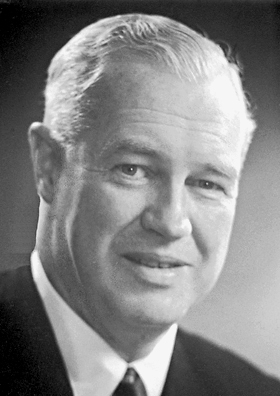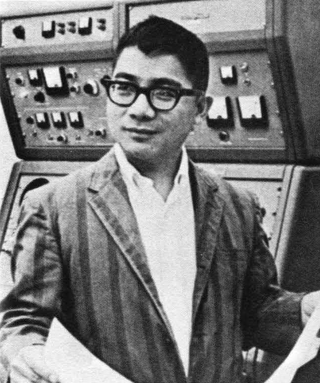Related Research Articles
Martin David Kamen was an American chemist who, together with Sam Ruben, co-discovered the synthesis of the isotope carbon-14 on February 27, 1940, at the University of California Radiation Laboratory, Berkeley. He also confirmed that all of the oxygen released in photosynthesis comes from water, not carbon dioxide, in 1941.

Alexander Robertus Todd, Baron Todd was a British biochemist whose research on the structure and synthesis of nucleotides, nucleosides, and nucleotide coenzymes gained him the Nobel Prize for Chemistry in 1957.

Henry Frederick "Fritz" Schaefer III is a computational and theoretical chemist. He is one of the most highly cited chemists in the world, with a Thomson Reuters H-Index of 121 as of 2020. He is the Graham Perdue Professor of Chemistry and Director of the Center for Computational Chemistry at the University of Georgia. Before becoming professor at Georgia he was professor at University of California, Berkeley and in 2004, he became Professor of Chemistry Emeritus, at UC Berkeley

John Roy Whinnery was an American electrical engineer and educator who worked in the fields of microwave theory and laser experimentation.
Annual Reviews is an independent, non-profit academic publishing company based in San Mateo, California. As of 2021, it publishes 51 journals of review articles and Knowable Magazine, covering the fields of life, biomedical, physical, and social sciences. Review articles are usually "peer-invited" solicited submissions, often planned one to two years in advance, which go through a peer-review process. The organizational structure has three levels: a volunteer board of directors, editorial committees of experts for each journal, and paid employees.
Ignacio "Nacho" Tinoco Jr. was a Professor of Chemistry at the University of California, Berkeley from 1956 to 2016.
Christopher J. Chang is a professor of chemistry and of molecular and cell biology at the University of California, Berkeley, where he holds the Class of 1942 Chair. Chang is also a member of the Helen Wills Neuroscience Institute, a Howard Hughes Medical Institute investigator, adjunct professor of pharmaceutical chemistry at the University of California, San Francisco, and faculty scientist at the chemical sciences division of Lawrence Berkeley Lab. He is the recipient of several awards for his research in bioinorganic chemistry, molecular and chemical biology.
Mimi A. R. Koehl is an American marine biologist, biomechanist, and professor at University of California, Berkeley, and head of the Koehl Lab. She was a MacArthur Fellow in 1990.
Daniel Israel Arnon was a Polish-born American plant physiologist and National Medal of Science recipient whose research led to greater insights into the operation of photosynthesis and nutrition in plants.
Wick C. Haxton is an American theoretical nuclear physicist and astrophysicist. He is a professor of physics at the University of California, Berkeley and senior faculty scientist at Lawrence Berkeley National Laboratory. He was appointed a co-editor of the journal Annual Review of Nuclear and Particle Science as of 2023.
Andrew Streitwieser was an American chemist known for his contributions to physical organic chemistry.
Gerhard Krohn Rollefson (1900–1955) was a professor of Chemistry at the University of California, Berkeley and a recipient of a Guggenheim Fellowship.

Judith P. Klinman is an American chemist, biochemist, and molecular biologist known for her work on enzyme catalysis. She became the first female professor in the physical sciences at the University of California, Berkeley in 1978, where she is now Professor of the Graduate School and Chancellor's Professor. In 2012, she was awarded the National Medal of Science by President Barack Obama. She is a member of the National Academy of Sciences, American Academy of Arts and Sciences, American Association for the Advancement of Science, and the American Philosophical Society.
Shaul Mukamel is a chemist and physicist, currently serving as a Distinguished Professor at the University of California, Irvine. He is known for his works in Non linear Optics and Spectroscopy.

Sunney Ignatius Chan is an American-born biophysical chemist. His work primarily focused on the use of various magnetic resonance spectroscopic and other physical chemical techniques in the analysis of various biochemical and biological problems.
Sabeeha Sabanali Merchant is a professor of plant biology at the University of California, Berkeley. She studies the photosynthetic metabolism and metalloenzymes In 2010 Merchant led the team that sequenced the Chlamydomonas genome. She was elected a member of the National Academy of Sciences in 2012.
Christopher Jarzynski is an American physicist and distinguished university professor at University of Maryland's department of chemistry and biochemistry, department of physics, and institute for physical science and technology, and fellow of the National Academy of Sciences. He is known for his contributions to non-equilibrium thermodynamics and statistical mechanics, for which he was awarded the 2019 Lars Onsager Prize. In 1997, he derived the now famous Jarzynski equality, confirmation of which was cited by the Nobel Committee for Physics as an application of one of the winning inventions of the 2018 Nobel Prize in physics—optical tweezers.
Jack Marvin Hollander was an American nuclear physicist. He held various positions in nuclear physics, energy, environmental research, and academic administration throughout his career. He was also the founding editor of the academic journal the Annual Review of Energy.
Robert James Cook is an American phytopathologist. He is best known for his work on soil-borne pathogens affecting wheat. He is the recipient of a Guggenheim Fellowship and the Wolf Prize in Agriculture and is a member of the National Academy of Sciences.
Walter Guido Vincenti was an American engineer who worked in the field of aeronautics, designing planes that could fly at hypersonic speed. He was elected as a member of several scientific societies, including the American Institute of Aeronautics and Astronautics and National Academy of Engineering. He won several prestigious awards, such as the Leonardo da Vinci Medal and the Daniel Guggenheim Medal.
References
- 1 2 "Stephen Leone". University of California, Berkeley. Retrieved 19 December 2018.
- 1 2 3 "Stephen R. Leone". University of California, Berkeley. Retrieved 19 December 2018.
- ↑ Leone, Stephen R. (September 25, 2008). "Autobiography of Stephen R. Leone". J. Phys. Chem. A. 112 (39): 9169–9176. Bibcode:2008JPCA..112.9169L. doi:10.1021/jp8062564. PMID 18817359.
- ↑ Johnson, Mark A.; Martinez, Todd J. (2012-04-04). "Preface". Annual Review of Physical Chemistry. 63 (1). doi: 10.1146/annurev-pc-63-040412-100001 . ISSN 0066-426X.
- ↑ "Editor of the Annual Review of Physical Chemistry - Volume 64, 2013". Annual Reviews. Retrieved 2 August 2021.
- ↑ "Stephen R. Leone". John Simon Guggenheim Memorial Foundation. Retrieved 19 December 2018.
- ↑ "Stephen R. Leone". United States National Academy of Sciences. Retrieved 19 December 2018.